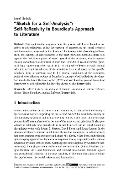“Sketch for a Self-Analysis” : Self-Reflexivity in Bourdieu’s Approach to Literature

Publication date
2022Published in
Perspectives on the Self: Reflexivity in the HumanitiesPublisher / Publication place
De Gruyter (Berlin)ISBN / ISSN
ISBN: 978-3-11-069845-9Metadata
Show full item recordCollections
This publication has a published version with DOI 10.1515/9783110698510-013
Abstract
The chapter explores how the pivotal role Pierre Bourdieu ascribes to self-reflexivity, in his theorisation of research in the social sciences and humanities, plays out in his theory of the literary field. According to Bourdieu, the concept of self-reflexivity is the most powerful methodological tool against the "scholastic point of view" typical of the academe, which imputes its own social logic to any object studied and is unable to account for the "practical logic" governing other social fields. A truly self-reflexive research should take into account the relation of the scholar to the social space, to the specific scholarly field in question and to the general conditions of the scholastic point of view. After an outline of Bourdieu's concept of self-reflexivity the chapter turns to the book The Rules of Art (1992) and asks how the general theoretical framework of self-reflexivity fits into the theory of the literary field.
Keywords
self-reflexivity, sociology of literature, sociology of science, literary theory, Pierre Bourdieu, author, habitus, literary field
Permanent link
https://hdl.handle.net/20.500.14178/1614License
Full text of this result is licensed under: Creative Commons Uveďte původ 4.0 International


